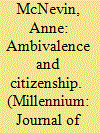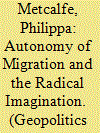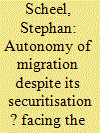| Srl | Item |
| 1 |
ID:
119985


|
|
|
|
|
| Publication |
2013.
|
| Summary/Abstract |
Irregular migration gives rise to political claims that test the limits of political community and the expression of human rights in an increasingly interconnected world. This article provides a theorisation of the political claims of irregular migrants that starts with the notion of ambivalence. I argue that the ambivalence present in such claims can be understood as a political resource that is generative of new political relations across the terrain of human mobility and border control. In order to discern the generative quality of ambivalence, I argue in addition for an approach to theory production that is grounded in concrete migrant struggles. The argument is made via a critique of two theoretical perspectives that are influential amongst scholars working at the intersection of Migration Studies and Political and International Theory: the work of Giorgio Agamben and the 'Autonomy of Migration'. An approach that avoids the reductive accounts of power evident in both perspectives provides a better starting point from which to assess the transformative potential of irregular migrants' political claims.
|
|
|
|
|
|
|
|
|
|
|
|
|
|
|
|
| 2 |
ID:
184311


|
|
|
|
|
| Summary/Abstract |
This paper discusses biometric borders in Europe, focusing on the Eurodac database and practises of fingerprinting people on the move in Greece as a politicised attempt to control and limit secondary movement as set out in the Dublin Regulation. The paper presents empirical research to explore one way in which migrants in Athens negotiate Eurodac; where alternative imaginaries informed ideas of ‘big’ and ‘small’ fingerprints, shaping interactions with the asylum service as well as secondary movement. I use Autonomy of Migration (AoM) theories to depict borders as places of ongoing conflict, subjectivity and transformation and introduce the work of Castoriadis’ social imaginaries and the radical imagination to explore migrants’ alternative imaginaries. I argue that these occur at points of friction, within the constraints of, and alongside, a dominant socio-technical imaginary driving the proliferation of biometric border controls. I believe this enables a deeper understanding of the autonomy with AoM theories. Here, autonomy is presented as instances of self-creation, spurred on through the radical imagination and shaping moments of uncontrollability, where the subjective dimension of migration informs both meanings of autonomy as well as alternative imaginaries. Ultimately, I argue that these practices seek to disrupt and challenge the dominance of biometrics as a signifier of control, identity and truth.
|
|
|
|
|
|
|
|
|
|
|
|
|
|
|
|
| 3 |
ID:
123588


|
|
|
|
|
| Publication |
2013.
|
| Summary/Abstract |
This article reconsiders the concept of autonomy of migration in the context of technologically ever-more sophisticated border regimes by focusing on the case of biometric rebordering. As its name suggests, the concept of autonomy of migration's core thesis proposes that migratory movements yield moments of autonomy in regards to any attempt to control and regulate them. Yet, the concept of autonomy of migration has been repeatedly accused of being based on and contributing to a romanticisation of migration. After outlining two advantages the concept of autonomy of migration offers for the analysis of biometric border regimes, I demonstrate that processes of biometric rebordering increase the warranty of the two allegations, which feed this major critique. Drawing on examples relating to the Visa Information System, I show that processes of biometric rebordering alter the practical terms and material conditions for moments of autonomy of migration to such an extent that it becomes necessary to rethink not only some of the concept of autonomy of migration's central features, but the notion of autonomy itself. In the final section, I therefore point out some directions to develop the concept of autonomy of migration as an approach, which is better equipped to investigate today's struggles of migration without being prone to the critique of implicating a romanticisation of migration.
|
|
|
|
|
|
|
|
|
|
|
|
|
|
|
|